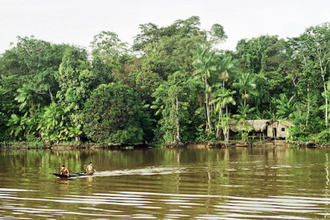New report: Amazon is being 'unsustainably exploited' by tax policies and profiteering

Amazonia - wiki image
Source: Christian Aid
Global lack of regulations, Brazilian state tax policies and corporate short-term profiteering are together perpetuating the unsustainable exploitation of the Brazilian Amazon and its peoples through industrial bauxite mining, a new report from Christian Aid, the Financial Transparency Coalition and Latindadd has found.
Christian Aid and its partners are calling on countries, in which parent companies of the aluminium producers and industrial mining companies that source or have sourced significant amounts of bauxite from companies mining bauxite in Brazil's Amazon are based, to adopt binding regulations requiring companies to take effective measures to prevent and mitigate adverse human rights and environmental impacts, including the deforestation of extensive areas of the Amazon Forest. Those countries include the UK, Norway, the US and Australia.
The report analyses the aluminium value chain in Brazil's Amazon, with a particular focus on the operations of the bauxite mining company Mineração Rio do Norte (MRN) as a case study. It also encompasses the actions and omissions of those multinational enterprises that, in addition to having a shareholding in one or more of industrial bauxite mining operating in Brazil's Amazon, source or have sourced significant amounts of bauxite from them. These multinational enterprises are Norsk Hydro, Alcoa, Rio Tinto and South32.
The Christian Aid report, Profit before people and planet - How public economic policies and corporate profit maximisation perpetuate the unsustainable exploitation of the Brazilian Amazon and its people, outlines how, according to research conducted by Brazilian civil society organisations and researchers, MRN's mining operations in Oriximiná in the state of Pará have contributed to the deforestation of extensive areas of the Amazon Forest and serious adverse human rights and environmental impacts on Quilombola and riverine communities. MRN's mining operations have polluted watercourses, hindering the access of these communities to good quality water, generating diseases and impacting on fishing activity, and deforestation by MRN's mining operations has affected access to food and natural resources that support livelihoods for these marginalised communities.
The exploitation of Brazil's Amazon by MRN and the actions and omissions by its shareholders to prevent and mitigate it affect us all because this behaviour negatively impacts the global environment and climate, given the central importance the Amazon's forests have to help stabilise the global climate.
The report demonstrates how Brazil's state policies grant large tax exemptions throughout the aluminium value chain, including bauxite mining, and large aluminium producers and mining companies have effectively maximised their economic benefits resulting from these policies. By so doing, these public policies significantly incentivise the mining companies operating in this region to continue operations and thus perpetuate the unsustainable exploitation of Brazil's Amazon by this sector.
The report also demonstrates that the international companies in question have largely failed to take appropriate actions to prevent and mitigate adverse human rights and environmental impacts related to MRN's operations, with only Norsk Hydro reporting that it had taken partial action to address some of these concerns, neglecting to use their significant influence in MRN's operations to prevent and mitigate its adverse human rights and environmental impacts. In fact, these companies have sourced, and continue sourcing, large amounts of bauxite from MRN that, not least because of significant tax exemptions, increase their profits over the short-term, while also receiving other economic benefits from MRN's operations.
Christian Aid's Economic Justice Lead, Emma Burgisser, warned these economic policies and structures are "effectively allowing mining companies and their shareholders free reign to continue to exploit people and planet to maximise private profits". She added: "The climate damage to the Amazon is not a problem thousands of miles away, it impacts us all and we stand in solidarity with the communities affected by the bauxite mining industry in the Brazilian Amazon. Those with the power to act, including the UK government, can and must do better and take urgent action."
The report concludes that together, Brazil's tax policies and corporate short-term profit maximisation are two key structural factors that must be changed to protect the biodiversity of Brazil's Amazon and the communities that have sheltered it for centuries, and against the global climate crisis.
The report makes a series of recommendations, including for countries in which parent companies of named aluminium producers and industrial mining companies are based, namely the UK, US, Norway and Australia, to:
- Adopt binding regulations requiring companies in these sectors to take effective measures to prevent and mitigate adverse human rights and environmental impacts linked to their operations, including through their business relations. This should include adopting mandatory regulations on corporate human rights and environmental due diligence, especially in business relations, in all economic sectors, and putting in place effective supervisory mechanisms to ensure this legislation is effectively implemented. This should also include supporting a binding treaty on business and human rights that reaffirms wider obligations and includes avenues for access to effective remedy.
- Regulate for mandatory public country-by-country reporting in terms of the profits and other key financial data in all jurisdictions where the company operates, and in the case of extractive industries, outlining this also on a project-by-project basis to understand taxes paid per project in which they participate. Regulating also for mandatory public beneficial ownership.
- Demand aluminium producers and industrial mining companies with significant business operations in relevant jurisdictions to prioritise in their sourcing bauxite mined in regions other than tropical forests, even if it is more expensive.
- Require companies in these sectors to design a plan to make their exit from tropical forests responsibly.
And for Brazil's Federal government and governments in relevant Brazilian states such as Pará and Maranhão to:
- Publicly evaluate and count the costs and benefits of mining operations in the Brazilian Amazon to the human rights of local communities, the environment and the ecosystem services these depend on an ongoing basis.
- Prioritise the rights and voice of these populations and the preservation of ecosystem services the region provides over the short-term.
- Ban new mining exploration in this region and take effective measures to ensure that industrial mining companies prevent and mitigate the harmful social and environmental impacts of their operations and provide effective remedy for those impacts already caused.
- Take effective measures to phase out existing mining operations in this region over the medium to long term. In consultation with the affected local communities, design a plan to do this phase out responsibly and take effective measures to transform the economy of the Amazon towards one anchored on human rights and ecological principles.
- Ensure that mining and related sectors involved in the aluminium value chain are adequately taxed, and take decisive action to eliminate tax exemptions in relation to these sectors, particularly in the Amazon.
- Put in place clear, transparent and credible political, legal and technical political processes for discussing tax exemptions. Ensure informed and effective participation of local communities in the design, decision-making and supervision of these tax policies.
Mineração Rio do Norte (MRN) is a privately held corporation specialised in the extraction, processing and sale of bauxite, with main operations in the municipality of Oriximiná, in Brazil's Amazon. In this municipality, MRN mines several of the plateaus of the Trombetas basin. MRN's mining operations began there in 1979, but there was a major expansion of the mine in 2003. MRN has extracted almost 450 million tons of bauxite by 2019. Since 2015, MRN has been responsible for between 39% and 48% of the total annual sales of bauxite production in Brazil. This exploration and extraction has caused the deforestation of extensive areas of tropical forest and serious socioenvironmental impacts on Quilombola and riverine communities.
Given MRN's significant role in bauxite mining in the Brazilian Amazon and its far-reaching impacts on people and the planet, this research delves more deeply into the economic policies and corporate practices that enable MRN and its shareholders, as typical of the sector, to continue to profit from these activities.
Read the full report here: www.christianaid.org.uk/resources/our-work/profit-people-and-planet


















